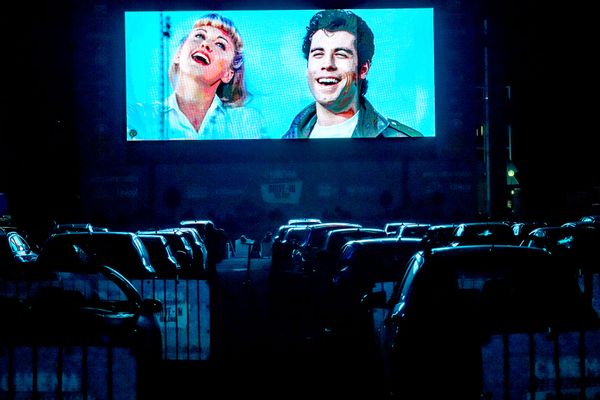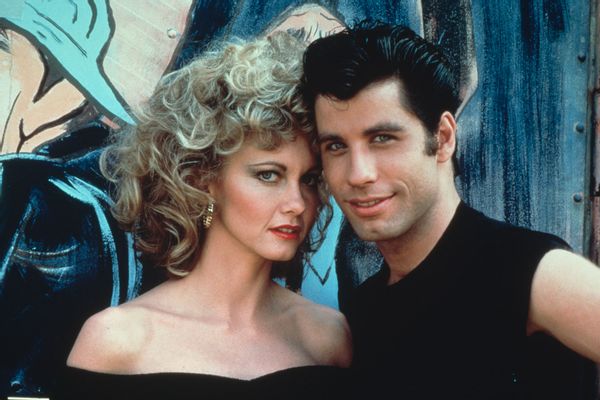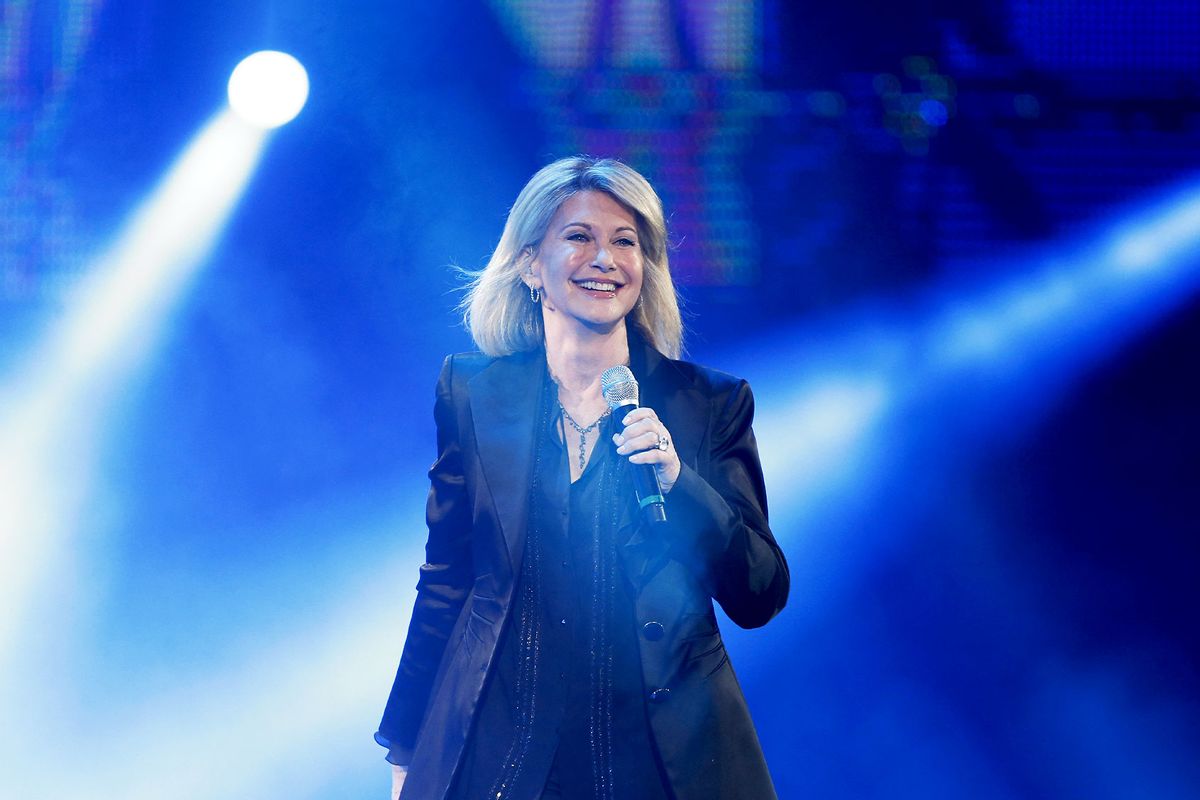An early memory I have is staring into giant blue eyes. They were Olivia Newton-John's eyes, rimmed in liner, on the cover of her 1975 album "Have You Never Been Mellow," a staple on my parents' record player, along with Peter, Paul and Mary, and John Denver. I saw those eyes again — and again and again — in "Grease" (1978), a film my little sister and I begged to watch and re-watch, perhaps initially due to the animated title sequence.
But Newton-John, who died at age 73 on Monday after dealing with cancer for many years, kept us watching. She embodies Sandy in the musical comedy, a vacationing high schooler who has a summer romance with John Travolta's local boy Danny Zuko. When Sandy's parents enroll her in Rydell High, where Danny attends and is the leader of the greaser gang, the T-birds, the romance has a chance to continue.
Both teens end up compromising for each other, with Sandy transforming from a perky good girl to a self-assured, gum-snapping, black-clad bad girl. That was a journey of confidence I wanted to make too, and I wasn't the only one. It would be years before I recognized Newton-John's full impact, particularly as a queer icon before it was cool, and a gay ally beginning at a time well before it was popular, accepted or even safe to do so.
Dame Olivia Newton-John was born in the United Kingdom. Her father was a onetime MI5 officer and her mother's Jewish family had left Germany to escape the Nazi regime. When she was 6, her family emigrated to Australia. She formed an all-girls singing group when she was barely a teenager. Though that band didn't last, she started appearing regularly on local television. She entered and won the TV talent contest "Sing Sing Sing." A year later, she recorded her first single. Album after album of hits soon followed.
 The film "Grease" starring John Travolta and Olivia Newton-John playing at the opening of a new drive-in cinema in Milan on June 24, 2020 in Milan, Italy. (Francesco Prandoni/Getty Images)Her career really took off after "Grease," an adaptation of a Broadway musical, which became the biggest hit of 1978. Newton-John, who was in her late 20s during filming, had to convince producers that she could play a teenager (Travolta was 23). She elevates the role which, frankly, is a little thin: the sweet, high-ponytailed, goody-goody who doesn't even have her ears pierced. The character's journey as written is less than empowering: to keep her man she's going to have to change.
The film "Grease" starring John Travolta and Olivia Newton-John playing at the opening of a new drive-in cinema in Milan on June 24, 2020 in Milan, Italy. (Francesco Prandoni/Getty Images)Her career really took off after "Grease," an adaptation of a Broadway musical, which became the biggest hit of 1978. Newton-John, who was in her late 20s during filming, had to convince producers that she could play a teenager (Travolta was 23). She elevates the role which, frankly, is a little thin: the sweet, high-ponytailed, goody-goody who doesn't even have her ears pierced. The character's journey as written is less than empowering: to keep her man she's going to have to change.
But as performed by Newton-John, it's uplifting, a battle cry of self-discovery.
Sandy's journey mirrored many a young queer person's path of personal transformation.
She goes after life with robust determination. She tackles it like one of those letter-wearing football jocks at Rydell. Sandy is as set on keeping Danny as she is on getting straight A's. As Vanity Fair writes, "Somehow, in her hands, Sandy's journey was inspiring: She grows from a naive girl to an empowered woman who's in control and knows what she needs. Oh yes, indeed."
 Australian singer and actress Olivia Newton-John and American actor John Travolta as they appear in the Paramount film 'Grease', 1978. (Paramount Pictures/Fotos International/Getty Images)In a way, Sandy's journey mirrored many a young queer person's path of personal transformation and being comfortable with yourself, even it that self changes or is seen as wrong by people who don't understand. According to PinkNews: "She proved that it was possible to own her sexuality, to change her image, and to move with the times."
Australian singer and actress Olivia Newton-John and American actor John Travolta as they appear in the Paramount film 'Grease', 1978. (Paramount Pictures/Fotos International/Getty Images)In a way, Sandy's journey mirrored many a young queer person's path of personal transformation and being comfortable with yourself, even it that self changes or is seen as wrong by people who don't understand. According to PinkNews: "She proved that it was possible to own her sexuality, to change her image, and to move with the times."
Sandy's journey paralleled Newton-John's too, as shortly after the film she released "Physical," the hit which would leave her innocent persona behind like a snakeskin. The music video for the song is, as PinkNews puts it: "literally the gayest thing on earth."
Gone was the doe-eyed teen. With Princess Diana-short hair, Newton-John dances in a black-tiled gym full of scantily clad, muscled men. She checks them out, helps them with their equipment (no, literally), and sings knowingly at the audience. This was no Jazzercise.
She took us along with her or at least, showed us it was possible to fly.
Newton-John's character gets a little sadistic assisting men in training and massage. There's a shower scene, and at the end of the video, couples of toned men walk off together, hand-in-hand, casting looks back at Newton-John who appears a bit puzzled, but it's fleeting. She's not judgmental at this obvious and earnest display of queerness. She grabs a different guy for her own.
The crowd went wild. In different ways. Beloved by gay fans, "Physical" was banned by multiple TV and radio stations. In an interview with ET, Newton-John admitted that at the time she was so nervous, she wanted to pull the song, but eventually, she felt grateful she stood behind it: "I'm finding that very often the things you are most afraid of or tentative about doing are the things you need to do."
Newton-John was never tentative about expressing love and admiration for her queer listeners. "I love you guys," she said directly in an interview from 2017: "I appreciate you." It was a sentiment she echoed again and again, in countless interviews and appearances over the years.
In the 1970s, Newton-John had had a close relationship with her hairdresser/makeup artist, who died of AIDS-related illness. She described the physicality and queerness of "Physical" as "quite natural at the time," to her, and was one of the first to speak up for marriage equality in Australia. She released a statement in 2012 that read, in part: "I believe that no-one has the right to judge and deny couples who love each other the ability to make a marriage commitment."
Want a daily wrap-up of all the news and commentary Salon has to offer? Subscribe to our morning newsletter, Crash Course.
Newton-John further endeared herself to queer fans with roles like the ancient Greek muse in current Los Angeles she played in the musical cult hit "Xanadu," and her lesbian ex-convict character, Bitsy Mae Harlin, in "Sordid Lives." As actor and queer activist George Takei wrote on Twitter: "I trust she is now in the great Xanadu beyond."
I'll always think of her spinning on my parents' turntable, her voice like an afternoon daydream — but also, floating off into the sunset in a convertible. She took us along with her or at least, showed us it was possible to fly; she turns back to wave, after all. She embodied both glamour and goodness, the nice girl who got what she wanted, her angelic treble as sweet as her message. As she told The Advocate in 2011: "I think love is love. You find it when you can."



Shares